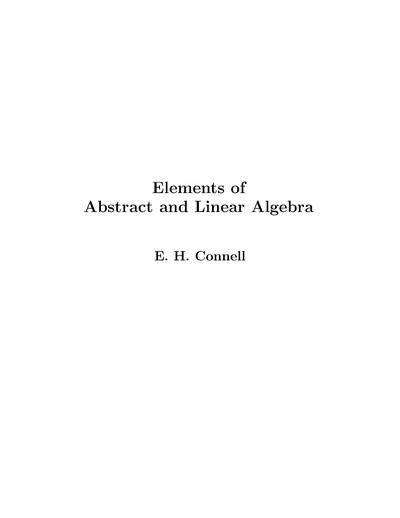
Elements of Abstract and Linear Algebra
A survey of abstract algebra with emphasis on linear algebra, presented in a compact and tightly organized, but still somewhat informal book.
Tag(s): Linear Algebra
Publication date: 01 Mar 2004
ISBN-10: n/a
ISBN-13: n/a
Paperback: 146 pages
Views: 28,301
Type: Textbook
Publisher: n/a
License: n/a
Post time: 27 Jul 2005 02:33:00
Elements of Abstract and Linear Algebra
 A survey of abstract algebra with emphasis on linear algebra, presented in a compact and tightly organized, but still somewhat informal book.
A survey of abstract algebra with emphasis on linear algebra, presented in a compact and tightly organized, but still somewhat informal book.
Publication date: 01 Mar 2004
ISBN-10: n/a
ISBN-13: n/a
Paperback: 146 pages
Views: 28,301
Document Type: Textbook
Publisher: n/a
License: n/a
Post time: 27 Jul 2005 02:33:00
Edwin H. Connel wrote:Elements of Abstract and Linear Algebra is a survey of abstract algebra with emphasis on linear algebra. It is intended for students in mathematics, computer science, and the physical sciences. The first three or four chapters can stand alone as a one semester course in abstract algebra, yet they are structured to provide the background for the chapter on linear algebra. The most difficult part of the book is about groups, which are written in additive and multiplicative notation, and the concept of coset, which is confusing at first. Yet, after the first fourth chapters the book gets easier as the linear algebra follows easily. Finishing the chapters on linear algebra gives a basic one year undergraduate course in abstract algebra. The rest of the material completes the course. Those with little background can do the first three chapters in the first semester, and chapters 4 and 5 in the second semester.
The presentation is compact and tightly organized, but still somewhat informal. The proofs of many of the elementary theorems are omitted. These proofs are to be provided by the professor in class or assigned as homework exercises.
This text is written with the conviction that it is more effective to teach abstract and linear algebra as one coherent discipline rather than as two separate ones. Also with this text the professor does not extract the course from the text, but rather builds the course upon it. It is easier to build a course from a base than to extract it from a big book. Because after the student extract it, he still have to build it. The bare bones nature of this book adds to its flexibility, because the student can build whatever course he want around it.
Tweet
About The Author(s)
Edwin Hale Connell is Professor Emeritus in the Department of Mathematics at the University of Miami. His research interests include Algebra and Topology.

Edwin Hale Connell is Professor Emeritus in the Department of Mathematics at the University of Miami. His research interests include Algebra and Topology.